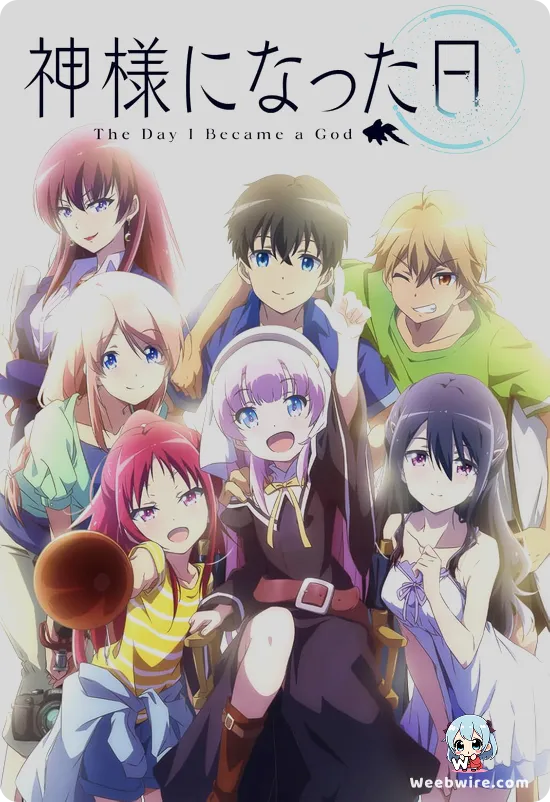

© P.A.WORKSwww.crunchyroll.com
Overview
The Day I Became a God, known in Japan as Kamisama ni Natta Hi, is a 2020 original anime series produced by the renowned studio P.A.WORKS. Crafted by the celebrated writer Jun Maeda, known for his emotionally resonant narratives in works such as Clannad and Angel Beats, this series weaves a compelling tale set against the backdrop of a serene Japanese town. The narrative centers on Yota Narukami, a seemingly ordinary high school student diligently preparing for his upcoming college entrance examinations. His mundane summer is irrevocably altered by the arrival of Hina Satou, an enigmatic young girl clad in traditional religious attire. Hina boldly declares herself the 'All-Knowing God' and, with unsettling conviction, prophesies the impending end of the world in precisely 30 days. Initially, Yota harbors deep skepticism regarding her extraordinary claims. However, his doubts are swiftly dispelled when Hina demonstrates genuine supernatural abilities, notably her uncanny power to accurately predict future events. Convinced of her preternatural insights, Yota reluctantly allows Hina to move into his home. What follows is a transformative summer vacation, shared not only with Hina but also with Yota's steadfast childhood friend, Kyoko Izanami. Their journey is a tapestry woven with whimsical escapades, profound life lessons, and significant interpersonal growth. The series masterfully blends light-hearted comedic scenarios and classic slice-of-life elements with dramatic interludes, all underscored by the looming deadline of Hina's apocalyptic pronouncement. As the story progresses, its initial playful tone gradually deepens, delving into complex themes of fate, profound love, and inevitable loss. The true nature of Hina's identity and abilities is meticulously unveiled: she is not a divine entity but a young girl afflicted with a rare neurological condition known as Logos Syndrome. A microchip, implanted in her brain by her grandfather, grants her vast knowledge but also tragically attracts the attention of government agencies. The anime skillfully navigates the delicate balance between fantastical elements and grounded human drama, emphasizing the profound bonds forged between its characters and the bittersweet, ephemeral nature of youth. P.A.WORKS' distinctive animation quality and a carefully curated soundtrack contribute significantly to an immersive viewing experience, showcasing their characteristic attention to emotional subtlety and evocative visual storytelling.
Opinion
The Day I Became a God presents a compelling, albeit somewhat uneven, entry into the distinguished catalog of P.A.WORKS and Jun Maeda. The series commences with a distinctive blend of quirky comedy and heartwarming slice-of-life elements, imbued with a subtle supernatural aura that is characteristic of Maeda’s previous acclaimed works. This initial phase, spanning approximately the first nine episodes, is largely episodic, characterized by vibrant, occasionally eccentric humor and the ingenious application of Hina’s purported 'divine' powers to resolve various personal dilemmas faced by the cast. During this period, the anime successfully cultivates a playful, almost magical realist atmosphere, significantly bolstered by P.A.WORKS’ consistently visually striking animation and a deeply evocative soundtrack, including the memorable opening theme 'Kimi to Iu Shinwa' and the poignant ending theme 'Goodbye Seven Seas.' The strength of the early episodes lies in their ability to establish a lighthearted, yet engaging, narrative rhythm. However, the series experiences a notable shift in its final act, which has elicited varied critical responses. The revelation concerning Hina’s true condition—a rare neurological disorder termed Logos Syndrome—and the subsequent intervention by government entities introduce a dramatically sharp tonal change. While this narrative pivot is undeniably ambitious in its scope, it has been critiqued by some for potentially oversimplifying or inadequately handling the sensitive themes of disability and personal autonomy, leading to discomfort among segments of the audience regarding the resolution of Hina’s character arc. In terms of character development, the portrayal is somewhat mixed. Yota Narukami functions as a sympathetic, though occasionally passive, protagonist whose reactions ground the more fantastical elements. Hina’s character, with her inherent whimsical charm and profound vulnerability, undeniably serves as the emotional nucleus of the narrative. The supporting cast, particularly Kyoko Izanami, adds crucial depth and helps anchor the extraordinary circumstances within relatable human drama. Thematically, the anime achieves its greatest resonance when it explores the transient nature of youth and the paramount importance of cultivating genuine human connections, themes that echo powerfully in Maeda’s earlier works. Ultimately, The Day I Became a God stands as a bittersweet parable of impermanence, elevated by commendable voice acting performances, meticulous visual polish, and moments of profound emotional impact, even as its later narrative decisions continue to provoke discussion and divide audience opinions.
Characters
Yota Narukami
Voice: Natsuki Hanae
Kyoko Izanami
Voice: Yui Ishikawa
Hina Satou
Voice: Ayane Sakura
Credits
Studio
P.A.WORKS
Cover Art
P.A.WORKS (Art Director: Kazuki Higashiji)
Publisher
Dengeki G's Magazine/ASCII Media Works
Producers
P.A.WORKS, ASCII Media Works, Bandai Namco Arts, Lantis
Episodes
Season 1
12 episodesInformation
Genres
Related Anime

Fullmetal Alchemist: Brotherhood

Haikyu!!

Gintama.: Slip Arc

Hajime no Ippo: The Fighting!

Mob Psycho 100 III
